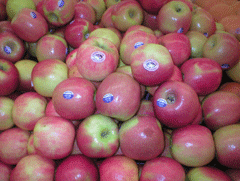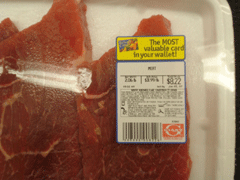Getting to Know Your Food
Air Date: Week of September 26, 2008

Country-of-origin stickers indicate these apples are actually Kiwis.
A law that requires food producers to label where meat, veggies and fruit come from goes into effect at the end of September. Meanwhile, the FDA says that labels on food products from genetically modified animals are not necessary. Senior Scientist Urvashi Rangan of Consumers Union talks turkey with host Bruce Gellerman.
Transcript
GELLERMAN: It's Living on Earth, I'm Bruce Gellerman.
They say there are two things you don’t want to see being made: laws and sausage … so what about laws that would regulate sausage? Sausage and other foods are part of a cool new federal law. COOL stands for ‘country of origin labeling.’ New labels telling you where your food comes from will start showing up in stores at the end of this month. Sausages are definitely not cool. To learn more about what is cool … and what isn’t … we turn to Urvashi Rangan, senior scientist and policy analyst with Consumers Union.
Hi Urvashi
RANGAN: Hi Bruce.
GELLERMAN: So is this good for consumers?
RANGAN: Great for consumers. We’ve always taken a long term position that consumers have a right to know how their food’s produced, what’s in it and the only way for consumers to know that is to read the labels on the foods that they buy.
GELLERMAN: Hmm. So the foods that I buy will have a label saying Chile or United States or Bolivia or something like that.
RANGAN: With a few exceptions - and I’m sure we’ll talk about those - meat, fish, peanuts, produce will all be required to have country of origin labeling.
GELLERMAN: Okay, so let’s take say cantaloupe. It’ll have a label.
RANGAN: It’ll have a label if its sliced and in a package being sold to you. It won’t have a label if it’s in a fruit salad being sold to you.
GELLERMAN: Lettuce?

Mystery meat no more?
RANGAN: Lettuce will also when it’s bagged have a label on it, but it will not be if it’s in a bag with other greens in a mixed green salad.
GELLERMAN: Hmmm. Frozen peas.
RANGAN: Frozen peas yes in the box, they’ll have the label, but if its mixed with carrots or corn in any kind of veggie mix, it will not.
GELLERMAN: So, I don’t get it. What’s going on here? Why will some things have labels and some not?
RANGAN: It’s tricky. Generally single commodities that are in packages are going to be required to be labeled under this law. If they’re mixed, in general, that will be the exception and they won’t be required to be labeled. If a meat establishment doesn’t buy more than a quarter of a million dollars in produce, it’s also exempt.
GELLERMAN: But that’s an exception you could drive a herd through.
RANGAN: It is, and unfortunately it may have been created through something as simple as bad language copying. When the law was written for meat, for example, there was some legislation language lifted from a state law regarding produce, and so, what’s ended up in our law is that if a meat establishment doesn’t buy more that a quarter of a million dollars in produce, it’s also exempt.
GELLERMAN: Urvashi – I want to switch gears a little bit and talk about a label that’s not going to happen on food. The Food and Drug is proposing guidelines that wouldn’t require labels for genetically modified foods.
RANGAN: Well, the FDA is basically saying that producers can go ahead and manufacture genetically modified animals and sell their products without having to label them. We think that that lack of labeling on food products is really irresponsible frankly to the American public. And it’s a major method when you hear things like mouse genes put into pigs or spider genes put into goats. We think people have a right to know that the pig they’re buying might have had mouse genes. And this FDA action to undo that and basically to say that those products don’t have to be labeled really does a disservice to that information base for consumers.

Country-of-origin stickers indicate these apples are actually Kiwis.
GELLERMAN: Urvashi, I’m going to pretend I understand why you would want to put a mouse gene in a pig, but what about spider genes in goats?
RANGAN: Spider genes have been put into goats so that their milk will make spider silk, and that can then be harvested for a variety of different purposes. Mouse genes were put into pigs to help them metabolize phosphorus more efficiently. So genetic engineering goes on for such a wide array of purposes. We think no matter what the purpose, no matter why it was done, that at the very least people should have the information that something was modified in that product that they were buying.
GELLERMAN: So the consumer wouldn’t have to guess what’s coming for dinner.
RANGAN: [LAUGH] that’s right. The consumer should not have to guess what’s coming to dinner. And whether its labeling for genetic modification or country of origin, that gives the consumer more information about who’s coming to dinner.
GELLERMAN: Well, thanks a lot Urvashi. I really enjoyed it.
RANGAN: Thanks, Bruce, it’s good to be here.
GELLERMAN: Urvashi Rangan is with Consumers Union. For more information about food labels check out our label ww.loe.org.
Links
To learn more about country of origin labeling, check out the Consumers Union’s “COOL Tool”
To learn more about the FDA and genetically modified animals, click here
Living on Earth wants to hear from you!
Living on Earth
62 Calef Highway, Suite 212
Lee, NH 03861
Telephone: 617-287-4121
E-mail: comments@loe.org
Newsletter [Click here]
Donate to Living on Earth!
Living on Earth is an independent media program and relies entirely on contributions from listeners and institutions supporting public service. Please donate now to preserve an independent environmental voice.
NewsletterLiving on Earth offers a weekly delivery of the show's rundown to your mailbox. Sign up for our newsletter today!
 Sailors For The Sea: Be the change you want to sea.
Sailors For The Sea: Be the change you want to sea.
 The Grantham Foundation for the Protection of the Environment: Committed to protecting and improving the health of the global environment.
The Grantham Foundation for the Protection of the Environment: Committed to protecting and improving the health of the global environment.
 Contribute to Living on Earth and receive, as our gift to you, an archival print of one of Mark Seth Lender's extraordinary wildlife photographs. Follow the link to see Mark's current collection of photographs.
Contribute to Living on Earth and receive, as our gift to you, an archival print of one of Mark Seth Lender's extraordinary wildlife photographs. Follow the link to see Mark's current collection of photographs.
 Buy a signed copy of Mark Seth Lender's book Smeagull the Seagull & support Living on Earth
Buy a signed copy of Mark Seth Lender's book Smeagull the Seagull & support Living on Earth

